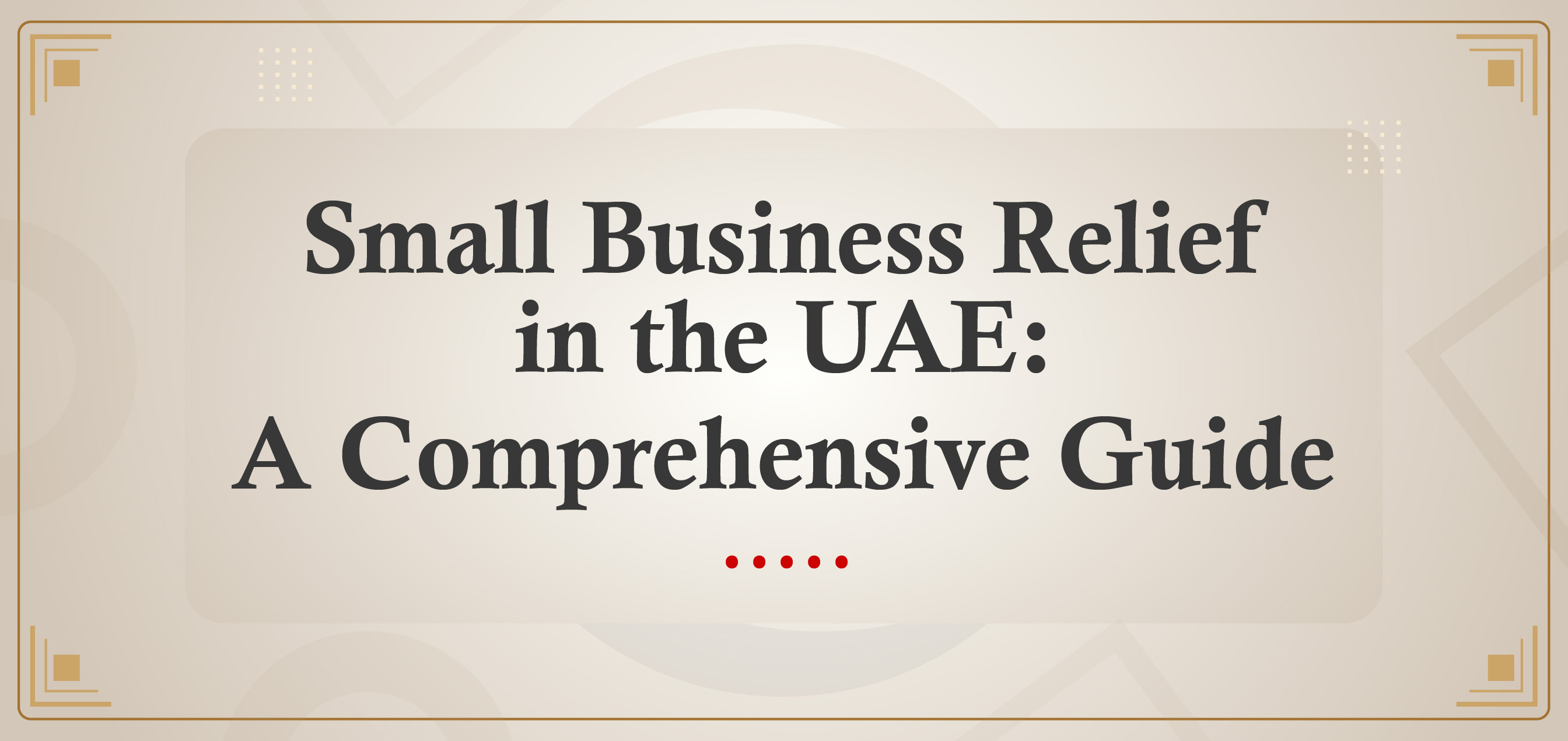
05 Apr 2024
Despite its complex and dynamic tax system, the business-friendly status of the United Arab Emirates is widely recognized. With the implementation of Corporate Tax and Value Added Tax (VAT), the UAE not only ensures regulated tax policies but also employs significant relief options for small enterprises. In this comprehensive guide, we’ll explore the relief measures offered for small businesses in Corporate Tax and VAT, empowering entrepreneurs to make informed decisions and navigate financial challenges with ease.
Corporate Tax & Small Business Relief in the UAE
The UAE business landscape shifted with the introduction of corporate tax by the UAE Ministry of Finance on 1 June 2023. Corporate Tax is a direct tax levied on the company's profits or income. The 9% Corporate Tax rate of the UAE has been levied only on businesses whose taxable income exceeds the threshold of AED 375,000, and these businesses must register for Corporate Tax. Businesses whose taxable revenue is less than AED 375,000 will be subject to a 0% rate. In addition to a low Corporate Tax rate of just 9%, certain relief have also been provided, including exempt sectors like public benefit entities and small businesses.
If a business wants to elect for small business relief, it is essential to consider the applicable eligibility criteria, accounting standards, and compliance requirements.
- Eligible Entities for Small Business Relief
To elect for a small business relief, a business must have a revenue of less than or equal to AED 3 million in the relevant tax period and any previous tax period, and the Person must be a Resident Person for Corporate Tax Purposes. This threshold is applicable to all tax periods that begin on or after 1 June 2023 and end before or on 31 December 2026.
Businesses that want to benefit from the small business relief and meet the required conditions must first register for Corporate Tax and make an election for small business relief in their Tax Return. This election should be made for each Tax Period that a Tax Return is filed for the relief to apply for that Tax Period.
- Benefits of Registering for Small Business Relief:
The Taxable Person electing for a small business relief will benefit in two aspects:
-
Administrative relief: With small business relief, they will no longer be required to calculate their taxable income and hence will achieve simplified tax return filing and record-keeping requirements. They will also be able to prepare Financial Statements with cash basis of accounting. Additionally, Transfer Pricing documentation rules are also not applied to Businesses in the Tax Period for which they elect for Small Business Relief.
-
Tax Relief: A Taxable Person elected for Small Business Relief will be treated as having no taxable income for the relevant tax period, and hence, they are exempt from paying any Corporate Tax in the Tax Period.
- Ineligible Entities for Small Business Relief
Although businesses whose income does not exceed AED 3,000,000 in a tax period are eligible for small business relief, there are certain exceptions to this rule:
-
Small Business Relief will not be applicable to a business that is a constituent company of a Multinational Enterprise Group (MNE) with a total consolidated group revenue of more than AED 3.15 billion.
-
Qualifying Free Zone Persons who already benefit from a 0% Corporate Tax Rate are not allowed to elect for a Small Business Relief.
-
When a Person artificially separates their Business into more than one entity to make the entity’s revenue below the threshold for Small Business Relief, this process is called Artificial Separation. Artificial Separation exempts an individual from Small Business Relief, and the FTA can issue an assessment to counteract the advantage. In such cases, the person will have to repay any unpaid Corporate Tax and relevant penalties.
- Impact on other Corporate Tax Rules:
Any disallowed Net Interest Expenditure and Tax Losses can be carried forward to future tax periods in which Small Business Relief is not elected by the business.
Value Added Tax (VAT) & Voluntary Registration for Small Businesses in UAE
Value Added Tax (VAT) was introduced in the UAE with the aim of diversifying income sources and providing high-quality public services. VAT is an indirect consumption tax on goods and services and is levied on the price of a product or service at each stage of the supply chain. The cost of VAT is borne by the end consumers, while businesses act as tax collectors for the government by collecting and accounting for VAT. 5% is the standard VAT rate in the UAE. However, some sectors have been exempted from the VAT, while some are subjected to a 0% rate. A small business can voluntarily register for VAT, keeping in mind the eligibility criteria and compliance with VAT regulations.
- Eligibility criteria Voluntary Registration of Small Businesses
UAE-based businesses whose taxable supplies and imports exceed AED 375,000 per annum are mandated to register for VAT. However, businesses are eligible to voluntarily register for VAT in UAE if their yearly taxable revenue exceeds AED 187,500.
Hence, small businesses or startups with taxable revenue exceeding AED 187,500 can consider voluntary VAT registration to avail the benefits associated with it and reflect their firm as reputable.
- VAT Registration:
The Federal Tax Authority has facilitated VAT Registration with an online process. Businesses that want to register can create and activate an EmaraTax account through FTA’s website. The required documentation, including financial statements and trade licenses, must be prepared for the initial process of VAT registration.
- Benefits of registering for VAT Registration:
While small businesses with revenue below AED 187,500 are not required to register for VAT, voluntary registration can offer a wide range of benefits that can uphold the success of a small business in the long run. Some of the benefits are:
-
VAT Reclaim: The ability to reclaim VAT is one of the most attractive benefits of VAT registration. VAT paid on business-related expenses and purchases can be reclaimed by the business, leading to significant savings and reduced tax burden.
-
Reputable Image & Credibility: VAT Registration upholds the integrity of your business and enhances its credibility for customers, suppliers, and partners. It reflects that the business is established, compliant with tax regulations, and follows best practices. It also instills confidence in stakeholders and investors.
-
Accurate Record-keeping: VAT registration necessitates maintaining detailed and accurate financial records, including VAT transactions, sales, and purchases. By complying with the record-keeping requirements of VAT, a business can benefit through better financial management practices and beneficial insights.
-
Competitive Edge & Expansion Opportunities: By signifying professionalism and a high business image, VAT registration not only offers better opportunities and credibility but also helps you achieve competitive pricing. Moreover, it facilitates a broad customer base as other VAT-registered businesses and large corporations prefer woking with a VAT-registered business.


.png)

